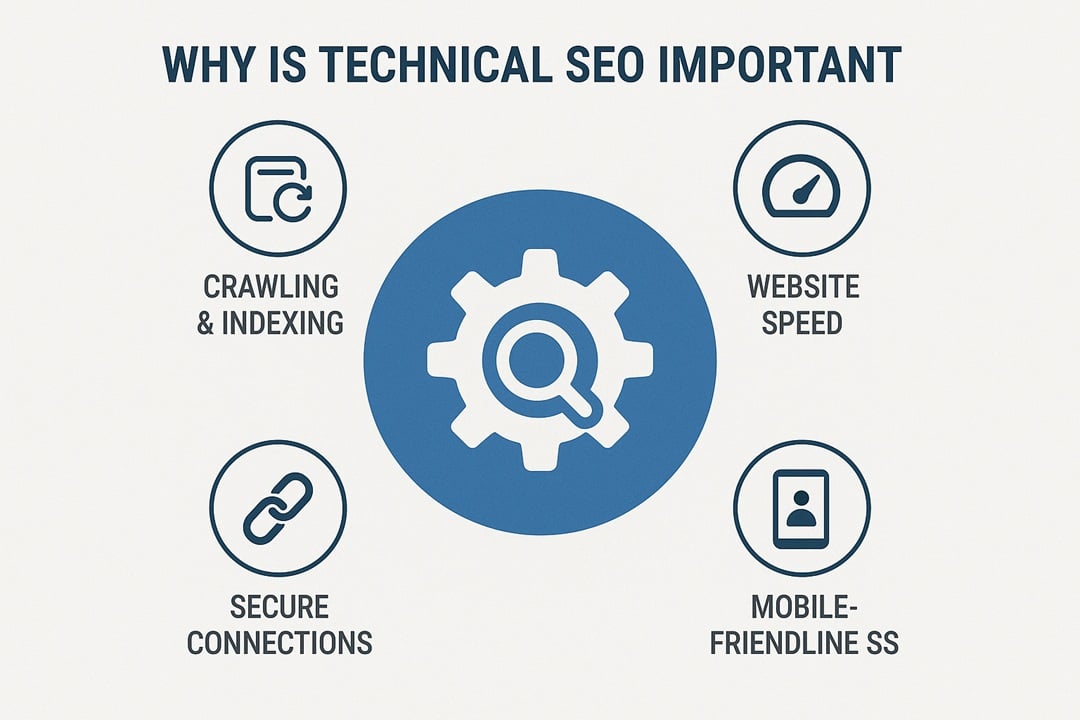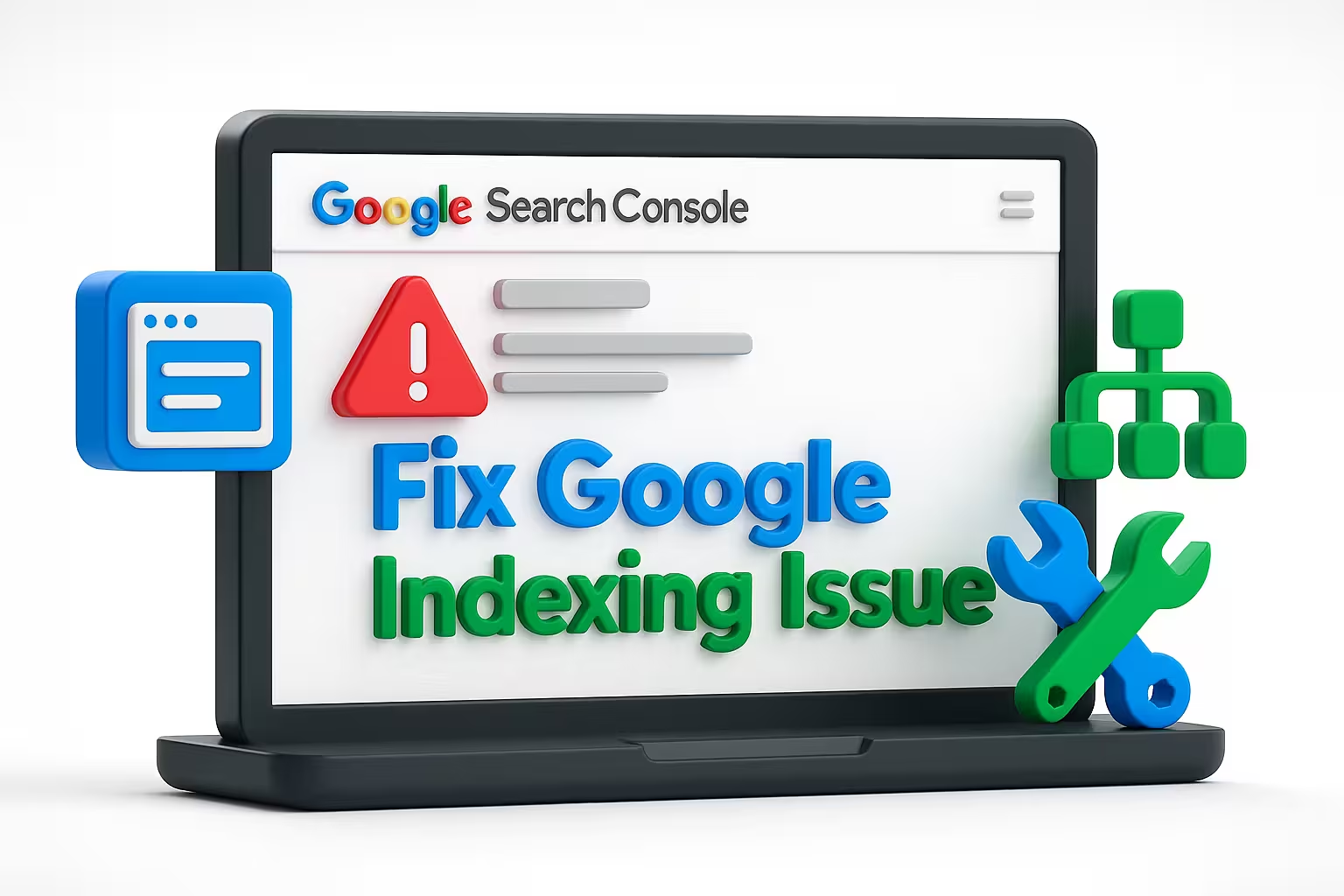Technical SEO serves as the basic building block for search engine optimization. On-page SEO works on improving content. Off-page SEO targets building links. Technical SEO focuses on the core structure of the website. In other words, it makes it easier for search engines to crawl through your site and index and rank it efficiently. Here’s how professional technical SEO services can improve your website and the benefits of technical SEO. They help boost its visibility in search results.
1. What is Technical SEO?
Technical SEO improves a website’s structure. It ensures the site meets search engine standards and boosts organic visibility. Technical SEO helps search engine bots access your website. It ensures efficient crawling, proper indexing, and smooth rendering. This process is crucial for search engines. It helps them understand and rank your site accurately, improving your search ranking. All the steps taken to make a website suitable for search engine spiders are referred to as technical SEO. It improves speed, security, mobile-friendliness, and general usability of the site. The four parameters of technical SEO are discoverability, performance, accessibility, and security.
Discoverability
Search engines like Google crawl the web using bots (Googlebot, Bingbot, etc.). Therefore, for better ranking potential, the bots could be able to discover and navigate your site easily. Broken links, poor URL structure, and an unoptimized robots.txt can cause issues. They may block crawling or make the website hard to find.
Performance
Key ranking factors include speed and overall website performance. Both are important for SEO. The loading time, interaction speed, and visual stability offered by Google’s Core Web Vitals are essential. GTmetrix and PageSpeed Insights are useful tools. They help find performance issues that affect rankings.
Accessibility
A website should be technically sound and accessible to everyone. This includes users with screen readers or outdated browsers. Adding sitemaps and canonical tags improves accessibility. They help search engines understand your content better.
Security
Google gives preference to secure sites which is why they are advocating for HTTPS instead of HTTP. To protect your users’ information and build trust with search engines, use SSL certificates. Keep your website security updated regularly as well.
2. Top 15 Benefits of Technical SEO
15 benefits are briefly discussed here:
- Improved Website Speed: User-friendly websites tend to load faster, more so because Google favors them. Technical SEO looks at those aspects that are hampering your website’s speed and offers ways to fix them.
- Enhanced Crawlability: To make sure your content is recognized, you need to improve its structure. This helps search engines’ crawlers find and index it more easily.
- Better Indexing: Technical SEO helps search engines index your pages more effectively. This increases the chances of your pages appearing in search results.
- Increased Search Engine Rankings: Fixing technical issues can improve your website’s ranking. Better structure also helps.
- Improved Mobile Friendliness: Technical SEO makes your website better for mobile devices. This is essential for ranking well in mobile search results.
- Enhanced User Experience: An optimized website improves user satisfaction with smooth navigation. This reduces bounce rates and boosts user engagement.
- Better Security: One key part of technical SEO is making your site more secure. Using HTTPS protects users and builds trust with both customers and search engines.
- Structured Data Implementation: Structured data, or schema markup, adds rich snippets to your listings. It also helps search engines understand your content better.
- Reduced Bounce Rates: Improving site speed and user experience is part of technical SEO. This helps reduce bounce rates, which sends positive signals to search engines.
- Improved Site Architecture: A well-structured site is easy for both users and search engines to navigate.
- Optimized URL Structure: Clear, descriptive URLs help search engines understand your content. They also improve the user experience.
- Enhanced Internal Linking: An important part of technical SEO is improving internal links. This ensures the distribution of page authority across the whole site as well as better navigation.
- Better Local SEO: Proper settings can boost local SEO. They help Google display addresses correctly.
- Increased Conversion Rates: Good website design attracts more visitors. This can lead to higher conversions and better overall conversion rates.
- Future-Proofing Your Site: Regular technical audits and updates keep your site up-to-date with changing search engine rules and technology.
3. How can you improve your technical SEO?
To improve your technical SEO, follow these steps:
- Conduct a Technical SEO Audit
-Identify and fix underlying website issues.
- Optimize Website Speed
– Improve loading times using tools like Google PageSpeed Insights.
- Ensure Mobile-Friendliness
– Implement responsive design for mobile users.
- Fix Crawl Errors
– Monitor and resolve errors using Google Search Console.
- Improve Site Architecture
– Structure your site logically with clear navigation.
- Switch to HTTPS
– Secure your site with an SSL certificate.
- Use Structured Data (Schema Markup)
– Add schema markup to enhance search visibility.
- Optimize XML Sitemap
– Keep your XML sitemap updated and submit it to Google.
- Enhance Internal Linking
– Strengthen page authority with relevant internal links.
- Fix Duplicate Content
– Use canonical tags to resolve content duplication issues.
- Implement Lazy Loading for Images and Videos
– Increases page load speed by loading images/videos only when they’re visible to the
user.
- Minimize Redirects
– Too many redirects slow down your website. Reduce them to improve speed.
- Use a CDN (Content Delivery Network)
– Helps in delivering your site content faster by distributing it across global servers.
- Enable Browser Caching
– Allows users to store parts of your website for faster access on return visits.
- Reduce DNS Lookups
– Minimize the number of domain lookups to speed up page loading.
4. Key Benefits of Professional Technical SEO Services
Professional technical SEO services start with a detailed site audit. They then fix any issues found. This results in a number of tangible benefits:
Improved Website Health and Usability
An expert SEO audit guarantees that the website is running its technical features at its best. For example, DeepCrawl helps identify SEO issues like broken links, missing content, or crawling errors. Fixing these can improve user experience and rankings. Solving them helps in enhancing both usability as well as search engine visibility.
The Warp Speed of Loading Pages
Page load speed is a determining factor in user satisfaction and SEO. Slow websites result in higher bounce rates hence lower user engagement and conversions. Tools like Lighthouse, Semrush, and GTmetrix can help identify what slows down your pages. This includes issues like excessive CSS or oversized images.
Increased Crawling and Indexing
Increasing the crawlability and indexation of your site by search engines can increase its visibility. Professional SEO services use XML sitemaps, robots.txt files, and canonical tags. These tools help ensure all important pages are indexed correctly. They also help Google and Bing understand and rank your site better.
Enhanced Mobile Performance
With Google’s mobile-first indexing, optimizing for mobile usability is no longer optional. Technical SEO services help your website perform well on mobile devices. They improve mobile layouts and responsive design. They also fix issues like slow load times and problems with AMP pages.
5. Common Technical SEO Mistakes and How to Avoid Them
1. Inbound Links not functioning correctly and their migrations
Fragile internal linking only leads to poor consumer satisfaction and influences SEO adversely. Chains of redirects further complicate the life of search engines and make page loading take more time. Regular checks can find and fix these issues. Use tools like Screaming Frog, Ahrefs, and others to maintain a good site structure.
2. Poorly Optimized Robots.txt and Meta Robots Tags
Poorly configured robots.txt files might make search engines unable to crawl through your site efficiently. Similarly, incorrect usage of meta robots tags could result in key pages not being indexed. Technical SEO specialists ensure those are set up correctly to avoid not being able to access crucial content by search engines.
3. Inconsistent URL Structure
A consistent and clean URL structure makes it easier for search engines to crawl and understand your site’s hierarchy. Avoid unnecessary URL parameters or long strings, and ensure all your pages use HTTPS.
4. Missing or Incorrect Canonical Tags
Canonical tags prevent duplicate content issues. These issues can confuse search engines and hurt your rankings. Professional SEO services can help set up canonical tags on your site to avoid these problems.
6. Technical SEO Tools to Enhance Your Strategy
Investing in the right tools is essential for a successful technical SEO strategy. Some of the best tools for professional services include:
- Google Search Console: Provides insights into your website’s indexing and crawling issues.
- Semrush: Offers keyword research and technical SEO auditing tools.
- Ahrefs: Specializes in backlink analysis but also offers insights into technical SEO.
- W3C Validator: It Helps ensure your site’s code is clean and error-free.
- GTmetrix: Focuses on site speed, breaking down areas for improvement.
7. How Technical SEO Aligns with Other SEO Strategies
6.1 On-Page SEO
On-page SEO focuses more on content optimization, but it requires a technically sound website to prosper. Site speed, mobile responsiveness, and proper indexing all impact how search engines find and show your content. These factors are crucial for visibility.
6.2 Off-Page SEO
Backlinks help build domain authority. However, they work best when the site is technically optimized. A poorly performing website may lose ranking signals generated by external links. Tools like MozBar provide insights into a site’s authority. They also help track technical SEO performance and off-page strategies.
8. The Importance of Regular Technical SEO Audits
It’s important to maintain a vehicle regularly so that it runs without problems. In the same way, an optimized website also needs regular technical SEO audits. This helps you find and fix new issues like broken links, crawl errors, or security problems. If left unresolved, these can hurt your rankings. Thus, it is vital that there are frequent SEO audits to ensure that a site runs well and stays at the top of search results over time.
Here are some reasons why:
Identify and Fix Crawling Issues
- Search engines ought to be capable of efficiently crawling and indexing your site. Ongoing audits can spot errors during crawling. They also identify blocked resources or other issues that stop search engines from reaching key pages.
Improve Website Speed
- User experience and SEO rankings are impacted negatively by slow loading times. Audits can reveal speed issues. These might include unoptimized images, too many redirects, or overly large code. Solving these problems improves performance.
Enhance Mobile-Friendliness
- Given that mobile-first indexing is now the trend, it thus becomes necessary for one’s site to be completely optimized for mobiles. Audits are helpful for fixing mobile usability problems. They address issues like non-responsive designs and slow mobile loading speeds.
Fix Broken Links and 404 Errors
- Broken links prevent users from browsing search engines. And users are frustrated by faulty pages. Regular checks help find and fix these issues. This ensures a smooth user experience and correct listing of websites in search engine indexes.
Ensure Proper Indexing of Content
- Some pages in your site may either be wrongfully indexed or not show up in search results at all. It is through audits that just pertinent pages get indexed thus getting rid of duplication and thin content risks.
Monitor HTTPS Implementation
- For user trust, it is essential to have HTTPS because it is a ranking sign too. Regular checks ensure your SSL certificate is set up correctly. If it’s not, it can harm your rankings and cause content errors.
Check for Structured Data Implementation
- Structured data boosts search engine comprehension of your content and may lead to rich snippets. Audits ascertain whether schema markup is properly implemented and working as it should.
Optimize XML Sitemap and Robots.txt
- Audits check that XML sitemaps and robots.txt files are set up correctly. This helps search engines crawl and index your site easily. It also stops pages that shouldn’t be indexed from being crawled.
Monitor Security Issues
- Audits help find security issues that malware or spammy links can exploit. These threats can lower your rankings and reduce user trust.
Adapt to Algorithm Changes
- Search engine algorithms are always changing. Regular technical SEO audits help you stay current with search engine ranking trends. This ensures your website remains relevant and optimized.
Enhance Website Architecture
- A properly structured website is an easy task to navigate both for search engines and users. Consistent audits help with the architecture of your site by making sure that pages are well-arranged and accessible in just a few clicks.
Maintain Proper Redirects
- Improper or outdated redirects (e.g., 301, 302 redirects) can affect SEO and user experience. Focusing on errors during audits ensures smooth redirects. This helps maintain link equity and prevents slower page load times.
Monitor and Reduce Duplicate Content
- Duplicate content confuses search engines while ranking potential is weakened on the whole. Regular audits help identify and fix duplicate content issues. Adding canonical tags ensures that the preferred version of your content is prioritized.
Optimize for Core Web Vitals
- A better user experience can improve Google search rankings. This includes how quickly a website loads, how soon users can interact with it, and how stable its visual appearance is. These factors are part of Core Web Vitals. Audits should track these important factors. This helps ensure the website meets performance standards throughout its life.
Ensure Proper Use of Meta Tags
- Auditing ensures key SEO elements, like title tags and header tags, are optimized for both users and search engines. Categories help organize elements like title tags, meta descriptions, and header tags. These are essential for SEO. The absence or wrong optimization of these meta tags may hurt search engine rankings and reduce click-through rates.
Update Outdated Content and URLs
- Regular audits will determine old content, old URLs, or unrelated information that needs to be updated. Keeping your content fresh and relevant improves SEO performance. It also boosts user engagement.
Ensure Website Accessibility
- Making accessibility changes helps everyone use your site better. For example, use descriptive alt tags for images and ensure proper contrast. These changes are especially important for users with disabilities. This change will improve your site’s SEO too. Regular audits ensure your site can be used by all users.
Improve Link Structure and Anchor Text
- Regular audits allow you to evaluate the quality and structure of both internal links and external links on your site. This ensures you use proper anchor text and distribute link equity effectively. It also helps avoid broken or spammy links.
Optimize for Local SEO
- For businesses targeting local markets, audits help implement local SEO factors on time. This includes ensuring consistent Name, Address, and Phone Number (NAP) across the web and using local structured data. This enhances visibility of localized searches thus increasing rankings in geo-targeted search engines.
Track Organic Search Performance
- Regular audits help track organic search performance over time. They can identify ranking drops or traffic declines caused by fluctuations. This approach allows you to find problems before they become major issues. It helps keep your site’s performance strong.
Manage Site Security
- Audits not only detect malware but also review your site’s security. This includes checking firewall protection, plugin vulnerabilities, and CMS security updates. This helps safeguard both users and your rankings from hacks and spam.
Optimize for International SEO (if applicable)
- If your website targets users in multiple countries, audits can ensure that hreflang tags (Hreflang is an HTML attribute used to indicate the language and geographic target of a webpage.), international URLs, and language settings are configured correctly. This avoids problems with search engine visibility and localization.
Maintain Compliance with SEO Best Practices
- SEO best practices continue to evolve as algorithms and technologies change. Regular audits keep you compliant with the latest standards allowing for optimization of your site both now and in the future.
Identify Emerging Technical Trends
- Audits also reveal new trends and opportunities. This includes new schema types, AMP (Accelerated Mobile Pages) implementation, and voice search optimization. These innovations help your site stay up-to-date with the latest technology.
Boost Competitiveness in Search Results
- Through regular audits, we get to know how our technical SEO compares to those of our competitors. Finding gaps in your website’s performance lets you make improvements. These changes can help you rank higher than other sites.
Regular technical SEO audits help you fix issues early. This improves user experience and keeps you competitive in search results. As a result, your rankings and website performance will improve.
Explore Our Technical SEO Solutions
Visit our Technical SEO Services page to learn more about how we can help improve your website’s performance and visibility.
For more insights on SEO best practices, check out Google’s SEO Starter Guide.







